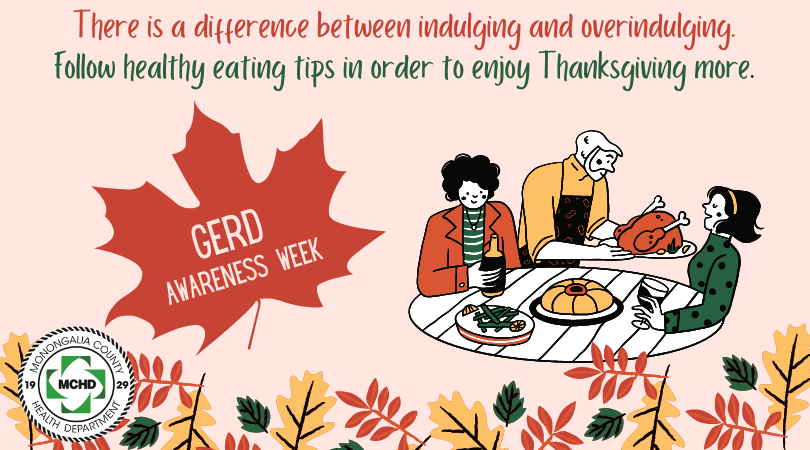Stuff the turkey, not your face: It's GERD Awareness Week

Nov. 23, 2022
By Mary Wade Burnside
Is it a coincidence that GERD Awareness Week encompasses Thanksgiving, what for many people is the biggest holiday invitation to pig out?
No, of course not.
GERD, or gastroesophageal reflux disease, is a very common ailment. And even those who only experience occasional acid reflux and heartburn understand that this is not a fun condition.
As someone who does have it and who experienced a severe relapse during the late summer, I’m here to tell you that GERD is something to be avoided.
At the worst of my symptoms, my esophagus felt like it was on fire, a burning line from my throat to my stomach.
A perfect storm of stress, a course of antibiotics and what I soon would realize was sleeping in the wrong position all conspired to bring this on and motivated me to make changes to help me feel normal again.
I know what some people will say: Thanksgiving is that time of year when you’re supposed to stuff your face and then lie down on the couch in a turkey tryptophan haze.
To that, I say no, it doesn’t have to be that way, and besides, to avoid heartburn, you really don’t want to lie down right after indulging in a large meal.
And the tryptophan thing might be a myth too.
According to the American Academy of Allergy Asthma and Immunology, GERD is a digestive disorder that occurs when acidic stomach juices, or food and fluids, back up from the stomach into the esophagus. It can affect people of all ages, from infants to older adults.
In addition to heartburn and acid reflux, symptoms also can include a chronic sore throat, laryngitis or hoarseness and even a cough. In fact, I was first diagnosed with GERD by an ear, nose and throat (ENT) specialist because I had no idea that my symptoms were related to digestion.
I quit drinking soda and wine and stuck to a plain diet. Pretty quickly, I was feeling a lot better.
But a few years ago, that burning sensation returned and I’ve been struggling ever since.
Once again, I have pretty much banished Diet Coke from my life and I’ve gotten pretty good at avoiding GERD trigger foods, which can also include peppers, red tomatoes, spicy food and even potato chips.
The good news this time of year is that overall, the foods we tend to eat at Thanksgiving usually aren’t big triggers, including pumpkin pie (although, unfortunately, not chocolate).
The International Foundation for Gastrointestinal Disorders (IFFGD), which promotes GERD Awareness Week, offers some Thanksgiving-specific tips to help sufferers enjoy the day while they eat and then, the way I look at it, continue to enjoy the day post-feast.
These include eating earlier, going easy on appetizers, remaining active (pre-meal Turkey Trot, anyone?), avoiding smoking, limiting alcoholic beverages, drinking water instead of soda, avoiding deep-fried turkey, using smaller plates, being careful with desserts and eating slowly.
Eating slowly is a habit that many of us can try to adopt. Being more mindful while you eat will go a long way toward helping your digestion and also helping to keep you from overeating once you experience fullness.
As for seconds, try to wait after finishing your first plate to see if you really want more.
I also make choices about what I want to eat. There is no point in consuming a roll or a dish that you don’t really care for just because you think it’s part of your traditional feast. That’s another aspect to being mindful, and making more room for the foods you really do enjoy.
If possible, taking a walk would be a great after-meal activity.
For those with more chronic issues, you might want to consider your sleeping situation in general. If you have an adjustable bed, try raising it a bit so that your body gently slopes downward. If not, you can purchase a wedge that goes under your mattress to accomplish this as well. It also can help reduce snoring.
Here’s to a happy, healthy and GERD-free Thanksgiving to all.
Mary Wade Burnside is the public information officer at Monongalia County Health Department.